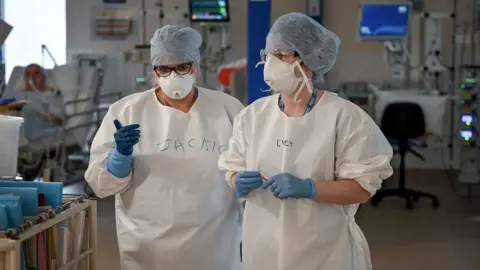Covid in Scotland: Hospital admissions down 47% in a month
 Getty Images
Getty ImagesThe number of people admitted to hospital in Scotland with Covid-19 has almost halved over the last four weeks, new figures have revealed.
Public Health Scotland data shows there were 851 Covid admissions in the week ending 19 April, a decrease of 46.9%.
The figure includes people who are admitted and treated for reasons other than the virus.
The overall number of positive cases in Scotland also fell to 20,791, a drop of 31.8% on the previous week.
Last week the Office for National Statistics reported the fourth weekly drop in Covid infections in a row.
The downward trend follows a period when Omicron and its BA.2 variant drove record-breaking case numbers across the country.
Despite infection levels virus restrictions have gradually eased in recent months and people in Scotland are no longer legally required to wear face coverings.
Of the number of positive tests, which were identified by PCR or lateral flow devices, 12.3% of reported cases were determined to be reinfections within 90 days.
The weekly Public Health Scotland (PHS) report also found the highest number of new hospital admissions are currently those aged 80 and over.
PHS considers patients with Covid those who tested positive for the virus in the 14 days before admission to hospital, on the day of admission or during their stay in hospital.
In the week ending 24 April there were 26 new admissions to intensive care units with a laboratory confirmed test of Covid.
The latest hospital figures compare with 1,603 admissions in the week ending 22 March.
Covid patients numbers peaked at the beginning of April, when there were 2,386 people in hospital with the virus, according to UK government data.
Shielding update
Meanwhile, the highest risk list, formerly known as the shielding list, will officially end on 31 May.
Experts found that for the vast majority of those on the list, the risk of hospitalisation or death from Covid has been significantly reduced and is no greater than that of the general public.
Dr John Harden, deputy national clinical director, said: "At the beginning of the pandemic we introduced shielding to protect the most vulnerable from a virus we knew little about.
"Thankfully, we know a lot more about the virus now.
"Combined with our successful vaccination programme and the availability of new treatments, means the clinical evidence clearly shows that the vast majority of people who have been on the highest risk list no longer need to consider themselves at any significantly higher risk."
He added support was still in place for the small number of immunosuppressed people who are unable to mount a full immune response due to their condition or ongoing treatment.


